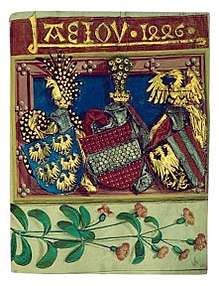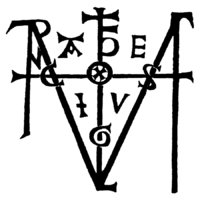A.E.I.O.U.
"A.E.I.O.U." (sometimes A.E.I.O.V.) was a symbolic device coined by Frederick III (1415–1493) and historically used as a motto by the Habsburgs. One note in his notebook (discovered in 1666), though not in the same hand, explains it in German and Latin as "All the world is subject to Austria" (Alles Erdreich ist Österreich untertan or Austriae est imperare orbi universo).[1] Frederick habitually signed buildings such as Burg Wiener Neustadt or Graz Cathedral as well as his tableware and other objects with the vowel graphemes.[2] As of 2017, A.E.I.O.U. is the motto of the Theresian Military Academy, established in 1751. It can also be found on the wall of the Chancellor's office in the Federal Chancellery.

Interpretation

Frederick's first use of the five-letter monogram was in 1437, when he was Duke of Styria. One note in his notebook (discovered in 1666), though not in the same hand, explains it in German and Latin as "All the world is subject to Austria" (Alles Erdreich ist Österreich untertan or Austriae est imperare orbi universo).[1]
Another passage, later in the same notebook, uses the letters in sequence as the initial letters of the words in the first line of a couplet poem, showing the meaning as "I am loved by the elect" (from Latin, amor electis, iniustis ordinor ultor).[1]
Other interpretations have been put forth, including by contemporary heraldists. Several explanations proceed on the assumption that it was meant as a political slogan, from the Latin phrases:
- Austria est imperio optime unita ("Austria is best united by the Empire").[3]
- Austria erit in orbe ultima ("Austria will be the last (surviving) in the world").[3]
- Austriae est imperare orbi universo ("It is Austria's destiny to rule the whole world").[3]
Since Frederick wrote this acronym when he was not yet the ruler of the Archduchy of Austria and, at that time, Styria was entirely separated from Austria and was not considered to be its part until the next century, the term "Austria" in this context would not mean Austria as a territory or a nation, but rather the "House of Austria", that is, the Habsburg dynasty.
More than 300 Latin and German interpretations have been attempted over the centuries; most of these versions refer to a motto of present-day Austria or the extensive Habsburg Monarchy.
See also
- Fiat iustitia, et pereat mundus – the motto of Ferdinand I.
- FERT – Another motto of a European dynasty (the House of Savoy) whose meaning and origin is unclear.
- In his novel Ulysses, Irish novelist James Joyce uses the device for comic effect after Stephen Dedalus borrows money from George Russell, a Dublin writer whose pen name was Æ: "A.E.I.O.U."
- Plus ultra – the personal motto of Charles V and I, and through him the modern motto of Spain.
- Austrian Empire
- Universal monarchy
References
- "AEIOU". Die Welt der Habsburger. Retrieved 2018-08-02.
- Brewer, E. Cobham (1978) [reprint of 1894 version], The Dictionary of Phrase and Fable, Edwinstowe, England: Avenel Books, p. 1, ISBN 0-517-25921-4
- "A", Meyers Konversationslexikon, (various authors), Volume 1, page 1, 1885–1890, web (Commons): MKL-b1-p1: has "A.E.I.O.U." on first page of entire 16-volume encyclopedia, as 3 Latin phrases: Austriae est imperare orbi universo and Austriae est imperium orbis universi with the German phrase Alles Erdreich ist Oesterreich unterthan noted with Friedrich III., plus a 3rd Latin phrase Austria erit in orbe ultima with Österreich wird bestehen bis ans Ende der Welt ("Austria will stand until the end of the world"); note that Oesterreich is Österreich ("Oe") with first letter "O". "Ö" is not considered a separate letter in German.
Further reading
- Andrew Wheatcroft's The Habsburgs: Embodying Empire (1995), ISBN 0-14-023634-1.
External links
